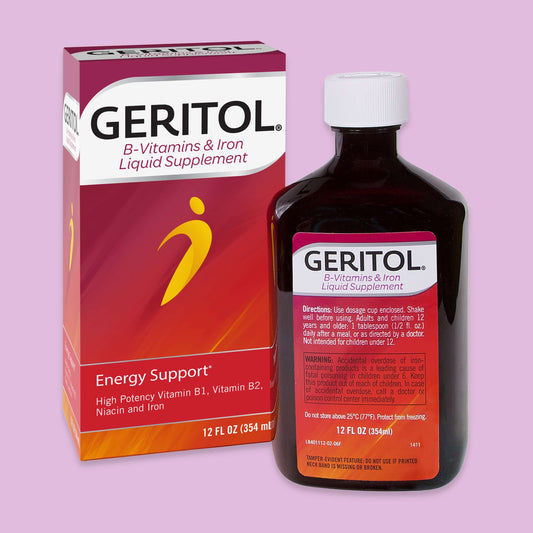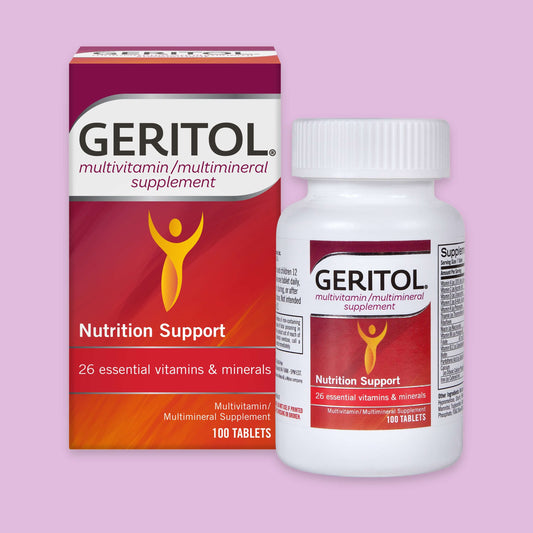Vitamins and minerals are found in a wide array of foods. And therefore, a balanced diet contains many different nutrient-rich foods which will help ensure you are meeting your vitamin and mineral needs.
FOOD SOURCES OF B VITAMINS AND VITAMIN D
B vitamins are found in a wide variety of foods including protein rich foods such as fish, poultry, meat, eggs and dairy. In addition, leafy green vegetables, beans and peas contain B vitamins, while breads and cereals often have added B vitamins.
B vitamin deficiencies are rare, though older adults, those with gastrointestinal disorders, strict vegetarians and individuals who have had gastrointestinal surgery have a greater risk of developing a B12 deficiency. In addition, the CDC recommends 400 mcg of folic acid through a multivitamin or fortified cereal for women who plan to become pregnant. The use of Geritol multivitamin has not been studied in pregnant women. It is not a substitute for your prenatal vitamin, so if you are pregnant or planning to become pregnant, talk to your doctor about your specific nutritional needs.
Very few foods are an excellent natural source of vitamin D. These include salmon, swordfish and tuna fish. However, several other foods are fortified with vitamin D such as orange juice, yogurt and cereal. In addition, mushrooms exposed to UV light while they are growing are an excellent source of vitamin D.
ANTIOXIDANT VITAMINS A, C AND E
Though many people focus on carrots for eye health (and carrots do contain carotenoids that are converted into vitamin A in the body) turkey, beef, whole milk, sweet potatoes, collards, kale, mangos, mixed vegetables and spinach are just a few other excellent sources of either carotenoids or vitamin A.
Vitamin C is another antioxidant vitamin. It is found in produce including red and green bell peppers, oranges, kiwifruit, strawberries, broccoli, Brussels sprouts and grapefruit.
There are eight chemical forms of vitamin E though just one, alpha tocopherol, is considered biologically important for humans. This fat-soluble vitamin is primarily found in nuts, seeds and their oils.
MINERALS
Minerals are grouped into those you need in large quantities (macrominerals) and those you need in small quantities (trace minerals). For example, potassium and magnesium are both macro minerals.
While tomatoes contain more potassium than any other food, several other fruits and vegetables are great sources of this mineral including all citrus fruits, kiwi, prunes and apricots as well as many vegetables including broccoli, peas and lima beans. Meat, chicken, fish including salmon, cod, flounder and sardines as well as milk, yogurt and nuts are also good sources of potassium.
Magnesium is found in many foods in small quantities. Excellent sources include almonds and spinach and good sources include fortified cereals, soybeans, cashews, potatoes, peanut butter and instant oatmeal.
AN EXAMPLE OF A NUTRIENT-RICH DAY:
BREAKFAST
Bowl of fortified whole-grain cereal with 1% milk
2 boiled eggs
SNACK
Banana with natural peanut butter
Greek yogurt (one that contains calcium and vitamins A and D)
LUNCH
Spinach salad with tomatoes, bell peppers, sunflower seeds and grilled salmon tossed in a balsamic vinagrette
Glass of milk
SNACK
1 serving Brazilnuts
DINNER
Shrimp
Corn on the cob
Steamed broccoli tossed in light soft spread
Glass of milk
Adding variety to your diet will help ensure you are consuming adequate amounts of most vitamins, minerals that you need for good health. Try at least one new food per week even if this means substituting the type of oil you use or alternating the flour you use in your favorite homemade muffins. And, if you cook at home, vow to try new recipes. Or, visit a salad bar, food tasting or restaurant and order something you’ve never tried before. For those vitamins and minerals you may be falling short on, consider a dietary supplement.
-
SOURCES:
Vitamins. MedlinePlus. NIH. Retrieved from: http://www.nlm.nih.gov/medlineplus/vitamins.html February 4, 2013.
B Vitamins. MedlinePlus. NIH. Retrieved from: http://www.nlm.nih.gov/medlineplus/bvitamins.html February 4, 2013.
Vitamin B12. Dietary Supplement Fact Sheet. Office of Dietary Supplements, NIH. Retrieved from: http://ods.od.nih.gov/factsheets/VitaminB12-HealthProfessional/ February 4, 2013.
Facts about Folic Acid. CDC. Retrieved from: http://www.cdc.gov/ncbddd/folicacid/about.html February 4, 2013.
Vitamin A. Medline Plus. NIH. Retrieved from: http://www.nlm.nih.gov/medlineplus/vitamina.html February 4, 2013.
Vitamin A. USDA Nutrient Database. Retrieved from: http://www.nal.usda.gov/fnic/foodcomp/Data/SR18/nutrlist/sr18w320.pdf February 4, 2013.
Vitamin C. Dietary Supplement Fact Sheet. Office of Dietary Supplements, NIH. Retrieved from: http://ods.od.nih.gov/factsheets/VitaminC-HealthProfessional/ February 4, 2013.
Vitamin E. Dietary Supplement Fact Sheet. Office of Dietary Supplements, NIH. Retrieved from: http://ods.od.nih.gov/factsheets/VitaminE-HealthProfessional/ February 4, 2013.
Potassium in the Diet. Dietary Supplement Fact Sheet. Office of Dietary Supplements, NIH. Retrieved from: http://www.nlm.nih.gov/medlineplus/ency/article/002413.htm February 4, 2013.
Magnesium. Dietary Supplement Fact Sheet. Office of Dietary Supplements, NIH. Retrieved from: http://ods.od.nih.gov/factsheets/Magnesium-HealthProfessional/ February 4, 2013.
Nutritional Supplements
Your One-Stop Shop for Premium Geritol Supplements
-
Regular price$13.99Regular priceSale price$13.99Unit priceper
Liquid Supplement
-
Regular priceFrom $6.99Regular priceSale priceFrom $6.99Unit priceper
Multivitamin Supplement



